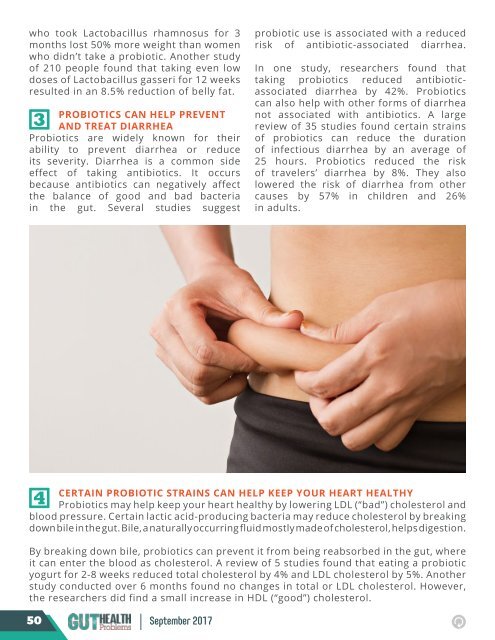Gut Health Problems - September 2017
In the eighth issue of Gut Health Problems, we have an overview of the vast benefits of probiotics, a checklist of foods rich in zinc, an intro to determining if you have fiber deficiency, and more. Intestinal discomfort, whether chronic or occasional, is something worth taking the time to prevent. And while we all have those foods that give us problems, you may actually be able to make a change that makes a bigger difference than you ever imagined.
In the eighth issue of Gut Health Problems, we have an overview of the vast benefits of probiotics, a checklist of foods rich in zinc, an intro to determining if you have fiber deficiency, and more. Intestinal discomfort, whether chronic or occasional, is something worth taking the time to prevent. And while we all have those foods that give us problems, you may actually be able to make a change that makes a bigger difference than you ever imagined.
You also want an ePaper? Increase the reach of your titles
YUMPU automatically turns print PDFs into web optimized ePapers that Google loves.
who took Lactobacillus rhamnosus for 3<br />
months lost 50% more weight than women<br />
who didn’t take a probiotic. Another study<br />
of 210 people found that taking even low<br />
doses of Lactobacillus gasseri for 12 weeks<br />
resulted in an 8.5% reduction of belly fat.<br />
3<br />
PROBIOTICS CAN HELP PREVENT<br />
AND TREAT DIARRHEA<br />
Probiotics are widely known for their<br />
ability to prevent diarrhea or reduce<br />
its severity. Diarrhea is a common side<br />
effect of taking antibiotics. It occurs<br />
because antibiotics can negatively affect<br />
the balance of good and bad bacteria<br />
in the gut. Several studies suggest<br />
probiotic use is associated with a reduced<br />
risk of antibiotic-associated diarrhea.<br />
In one study, researchers found that<br />
taking probiotics reduced antibioticassociated<br />
diarrhea by 42%. Probiotics<br />
can also help with other forms of diarrhea<br />
not associated with antibiotics. A large<br />
review of 35 studies found certain strains<br />
of probiotics can reduce the duration<br />
of infectious diarrhea by an average of<br />
25 hours. Probiotics reduced the risk<br />
of travelers’ diarrhea by 8%. They also<br />
lowered the risk of diarrhea from other<br />
causes by 57% in children and 26%<br />
in adults.<br />
4<br />
CERTAIN PROBIOTIC STRAINS CAN HELP KEEP YOUR HEART HEALTHY<br />
Probiotics may help keep your heart healthy by lowering LDL (“bad”) cholesterol and<br />
blood pressure. Certain lactic acid-producing bacteria may reduce cholesterol by breaking<br />
down bile in the gut. Bile, a naturally occurring fluid mostly made of cholesterol, helps digestion.<br />
By breaking down bile, probiotics can prevent it from being reabsorbed in the gut, where<br />
it can enter the blood as cholesterol. A review of 5 studies found that eating a probiotic<br />
yogurt for 2-8 weeks reduced total cholesterol by 4% and LDL cholesterol by 5%. Another<br />
study conducted over 6 months found no changes in total or LDL cholesterol. However,<br />
the researchers did find a small increase in HDL (“good”) cholesterol.<br />
50<br />
<strong>September</strong> <strong>2017</strong>

















